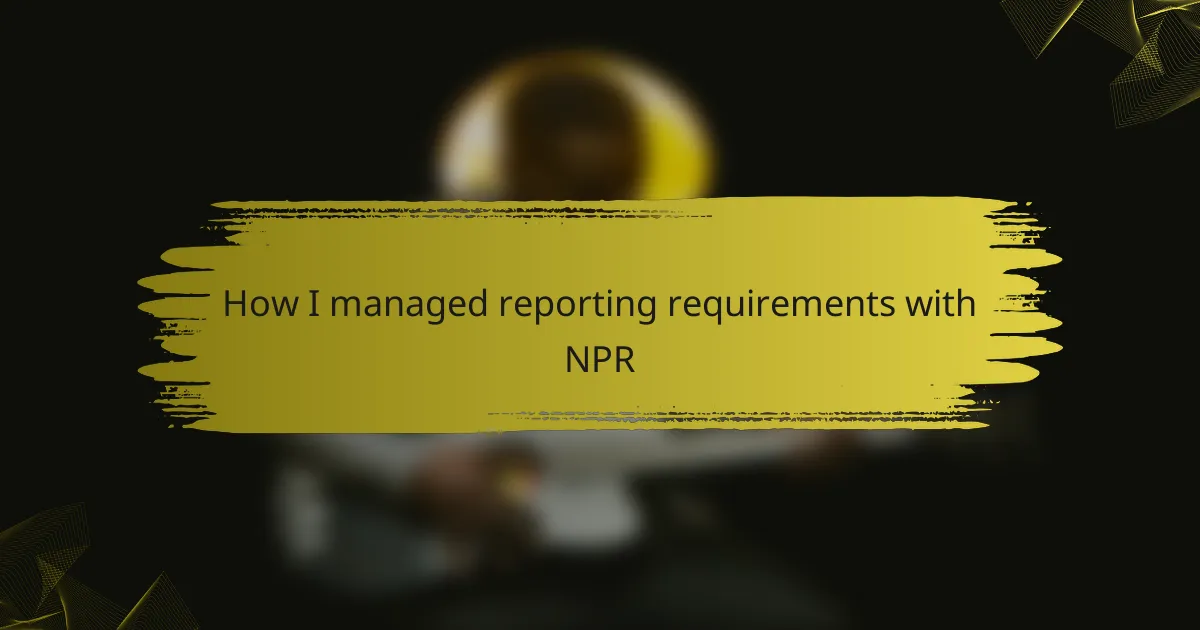Key takeaways
- Independent radio media fosters community engagement through local content and diverse perspectives.
- Adhering to reporting requirements enhances accountability, trust, and the quality of journalism.
- Effective compliance strategies include establishing reporting timelines and promoting team communication.
- Utilizing digital tools like Trello and Google Drive streamlines task management and collaboration.

Understanding independent radio media
Independent radio media offers a unique voice that often gets overlooked in the broader media landscape. I’ve found that it’s not just about broadcasting news; it’s about creating a community. For me, attending local events and interviewing community members brought an emotional depth that I believe is essential for capturing the spirit of independent broadcasting.
One of the most enriching experiences I’ve had was working closely with grassroots organizations. It allowed me to share stories that mattered to our audience, and I could feel the impact of our broadcasts in real-time. Here are some key aspects of independent radio media that highlight its importance:
- Emphasis on local content and community involvement.
- Diverse perspectives that challenge mainstream narratives.
- Opportunities for creative storytelling and innovative formats.
- Strong connection with listeners through interactive programming.
- Platforms for underrepresented voices and social issues.
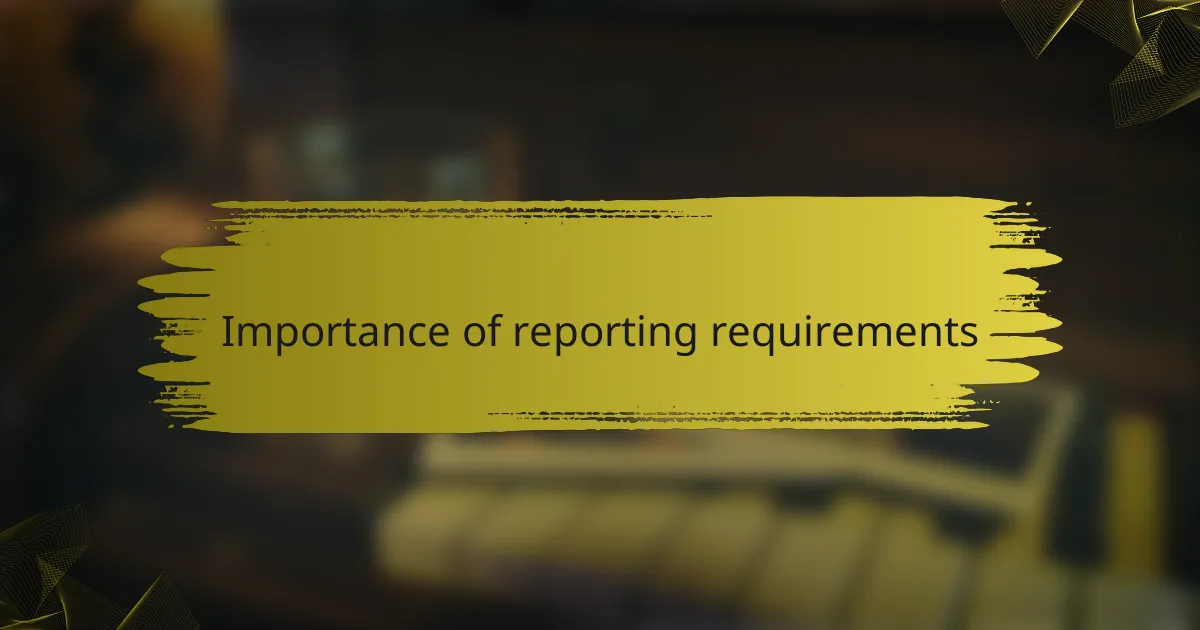
Importance of reporting requirements
Reporting requirements serve as a backbone for any independent radio media outlet. In my experience, these guidelines ensure that our broadcasts maintain a level of accountability and transparency that resonates with our audience. When we follow these requirements, we not only meet legal obligations but also build trust with our listeners.
I remember a time when we surveyed our audience about their concerns regarding local issues. The feedback highlighted the importance of clear reporting on these themes. It was a wake-up call for me; I realized that, along with passion and creativity, adherence to reporting standards creates a solid framework for our storytelling.
Moreover, comprehensive reporting requirements can actually enhance the quality of our content. They challenge us to dig deeper and think critically about the stories we present. Do we fully understand the implications of the narratives we share? By sticking to these requirements, we elevate our journalism and ensure that every voice in our community is respected and heard.
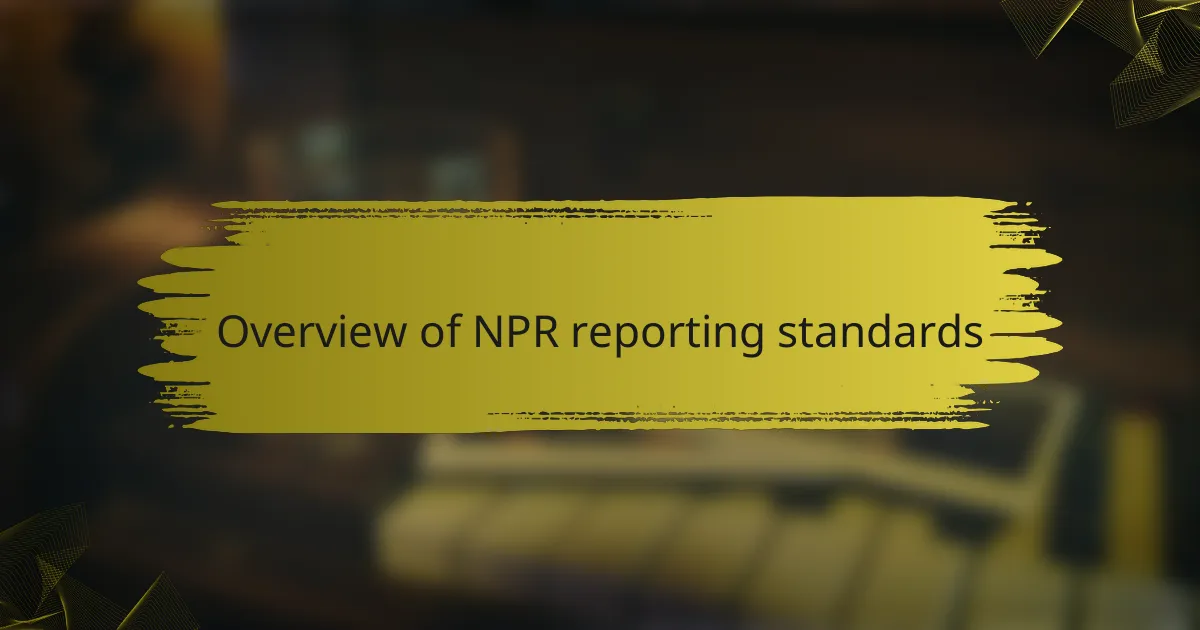
Overview of NPR reporting standards
NPR has specific reporting standards that emphasize accuracy, fairness, and transparency. I found that adhering to these principles not only boosted my credibility but also built trust with my audience. In my experience, taking the time to fact-check and providing balanced perspectives can be challenging yet immensely rewarding as it fosters a respect for journalistic integrity.
Here’s a comparison of NPR’s standards versus traditional media standards:
| NPR Reporting Standards | Traditional Media Standards |
|---|---|
| Emphasis on Accuracy | Focus on Timeliness |
| Commitment to Fairness | Occasional Bias |
| Transparency in Sources | Less Emphasis on Source Disclosure |
| Encouraging Audience Engagement | Limited Audience Interaction |
My personal journey with these standards has led to stronger connections with listeners, as they appreciate the dedication to responsible journalism.

Strategies for effective compliance
Effective compliance with NPR reporting requirements doesn’t just hinge on knowing the rules; it’s about developing strategies that work for your unique station. From my experience, creating a clear timeline for reporting deadlines has been invaluable. Establishing a routine helped ensure that we never missed a submission, allowing us to focus on producing quality content.
Another tactic that proved significant was implementing a centralized tracking system for all reporting documents. It made it easier to monitor progress and accountability. Seeing tasks get checked off felt rewarding and kept the team motivated. I learned that strong communication within the team fosters a culture of responsibility, making compliance a collective effort.
Now, let’s dive into some practical strategies alongside their outcomes for easier visualization:
| Strategy | Outcome |
|---|---|
| Establish a reporting timeline | Reduces missed deadlines and relieves stress |
| Utilize a centralized tracking system | Enhances accountability and visibility on progress |
| Promote team communication | Cultivates a culture of responsibility and shared goals |
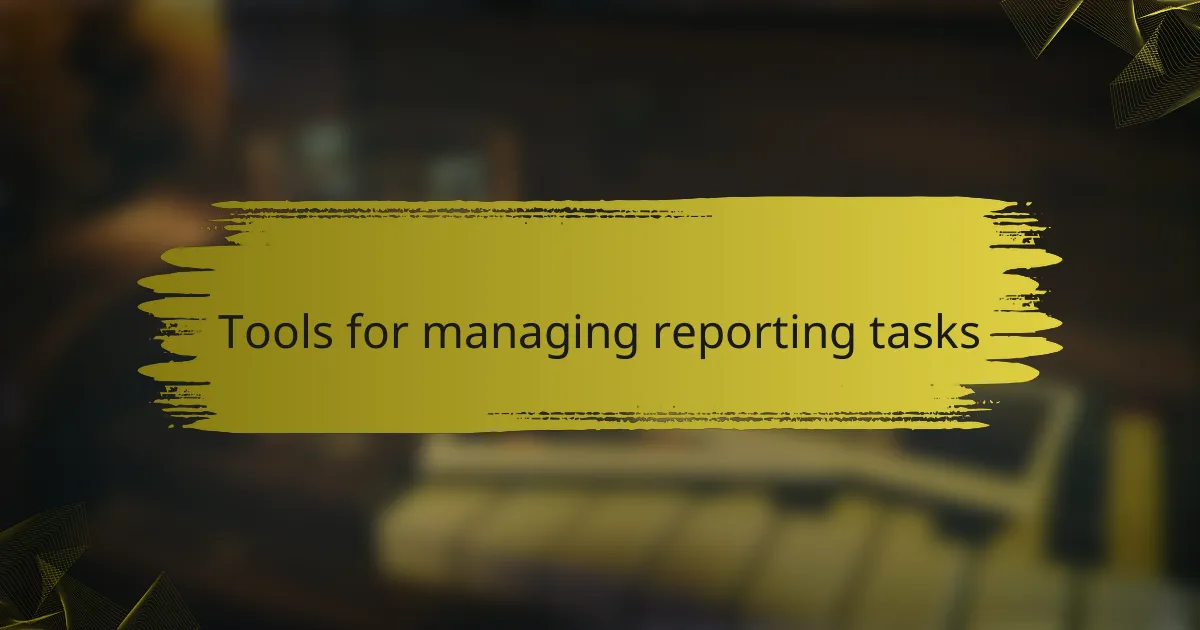
Tools for managing reporting tasks
When it comes to managing reporting tasks effectively, I’ve found that a good set of tools can make all the difference. For instance, using digital project management platforms like Trello or Asana helps me keep track of deadlines and ensures that nothing slips through the cracks. I still remember the early days of my reporting journey, where I relied on spreadsheets, only to find myself overwhelmed. That experience taught me the value of streamlined processes.
Another tool that has become invaluable is Google Drive for collaborative efforts. It allows team members to contribute to reports in real time, fostering a sense of teamwork and shared responsibility. I vividly recall a tense situation where our deadline was looming, and we managed to pull everything together seamlessly because we could all work side-by-side, even if we were miles apart.
In the end, the key takeaway for me is that the right tools not only enhance productivity but also empower me and my team to focus on storytelling without the stress of managing logistics.
| Tool | Description |
|---|---|
| Trello | Visual project management for tracking tasks and deadlines. |
| Asana | Task management tool that helps teams plan, organize, and collaborate. |
| Google Drive | Cloud-based storage allowing real-time collaboration on documents. |
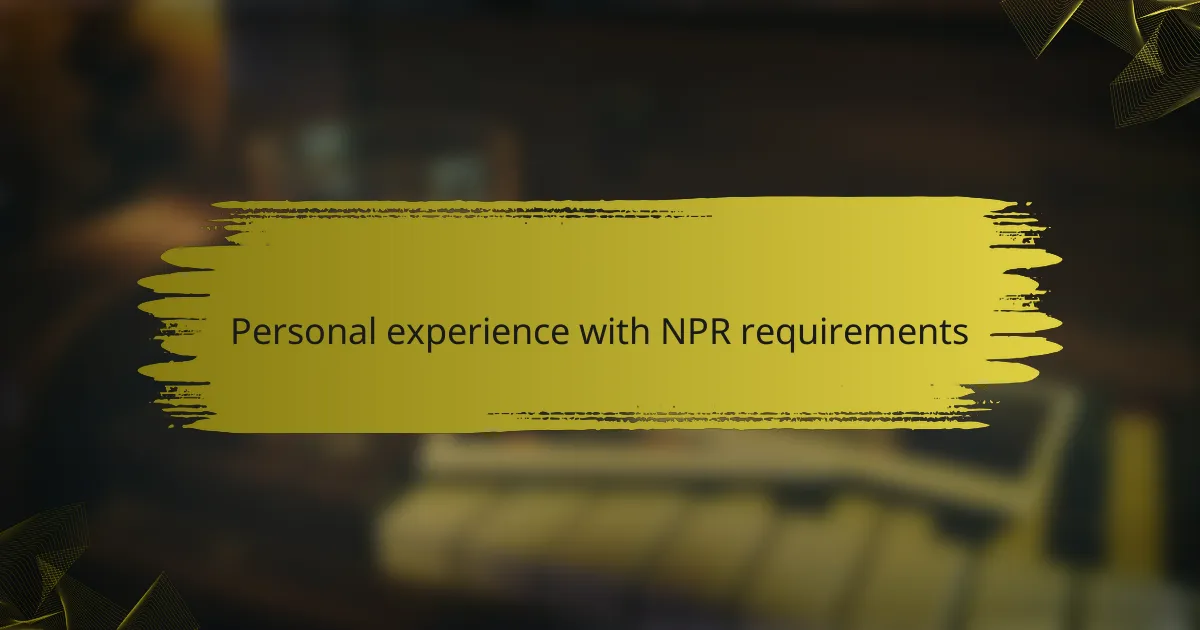
Personal experience with NPR requirements
Navigating the reporting requirements with NPR has been quite a learning journey for me. Initially, I underestimated the level of detail needed in my reports, but I quickly realized that clarity and transparency are paramount. One particular instance comes to mind when I received feedback on my first submission. It was constructive and made me reevaluate my approach, ultimately leading to more streamlined and effective reports.
I also found the collaborative spirit among independent stations invaluable. Sharing experiences with peers helped me grasp the implications of NPR’s requirements on a deeper level. These interactions not only boosted my confidence but also fostered a sense of community that I truly value.
| NPR Requirement | My Experience |
|---|---|
| Detail and Accuracy | Initially challenging, but became easier with practice. |
| Deadlines | Sticking to them was stressful, yet rewarding when met. |

Lessons learned from the process
Navigating the reporting requirements with NPR was an eye-opening experience for me. I learned the importance of thorough documentation; it felt almost like keeping a diary of my journey. Each entry, whether a challenge or a success, provided valuable insights, making the process less daunting.
I also discovered the power of collaboration. Engaging with my team fostered a supportive environment, where shared knowledge and resources turned the overwhelming task into manageable steps. It reinforced the idea that we’re stronger together.
Moreover, regular check-ins became crucial. They helped to align our goals and ensured we stayed on track, alleviating much of the stress I initially felt. Looking back, I see these lessons as not just practical tips but as building blocks for my professional growth.
| Lesson | Insight |
|---|---|
| Thorough Documentation | Keeping detailed records illuminated my process. |
| Team Collaboration | Working together made the workload lighter. |
| Regular Check-Ins | They kept us aligned and reduced stress. |
